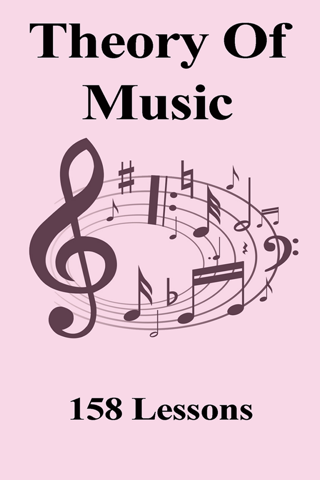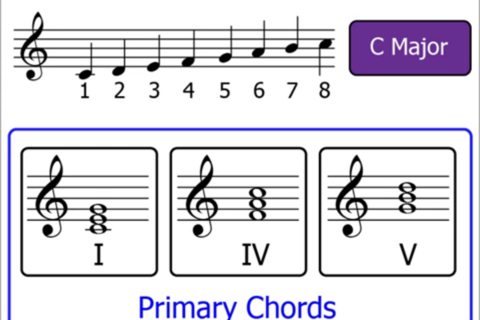
To learn to play an instrument is fun and can give a lifetime of pleasure. Learning the theory of music will help any budding musician along the way.
This app has some 158 easy to follow tutorial lessons that will soon give you an insight into the world of music and will soon help you understand the basics.
Lessons include:
Lecture 1 introduction
Lecture 2 Introduction to Instruments and Musical Genres
Lecture 3 Rhythm Fundamentals
Lecture 4 Rhythm Jazz Pop and Classical
Lecture 5 Melody Notes Scales Nuts and Bolts
Lecture 6 Melody Mozart and Wagner
Lecture 7 Harmony Chords and How to Build Them
Lecture 8 Bass Patterns Blues and Rock
Lecture 9 Sonata-Allegro Form Mozart and Beethoven
Lecture 10 Sonata-Allegro and Theme and Variations
Lecture 11 Form Rondo Sonata-Allegro and Theme and Variations cont
Lecture 12 Guest Conductor Saybrook Orchestra
Lecture 13 Fugue Bach Bizet and Bernstein
Lecture 14 Ostinato Form in the Music of Purcell Pachelbel Elton John and Vitamin C
Lecture 15 Gregorian Chant and Music in the Sistine Chapel
Lecture 16 Baroque Music The Vocal Music of Johann Sebastian Bach
Lecture 17 Mozart and His Operas
Lecture 18 Piano Music of Mozart and Beethoven
Lecture 19 Romantic Opera Verdis La Traviata Bocelli Pavarotti and Domingo
Lecture 20 The Colossal Symphony Beethoven Berlioz Mahler and Shostakovich
Lecture 21 Musical Impressionism and Exoticism Debussy Ravel and Monet
Lecture 22 Modernism and Mahler
Lecture 23 Review of Musical Style
Music Theory - Using the Circle of Fifths for Major Keys
The Unanswered Question 1973 1 Musical Phonology Bernstein Norton
The Unanswered Question 1973 2 Musical Syntax Bernstein Norton
The Unanswered Question 1973 3 Musical Semantics Bernstein Norton
The Unanswered Question 1973 4 The Delights Dangers of Ambiguity Bernstein Norton
The Unanswered Question 1973 5 The XXth Century Crisis Bernstein Norton
The Unanswered Question 1973 6 The Poetry Of Earth Bernstein Norton
Leonard Bernstein Young Peoples Concerts What is Orchestration Part 1 of 4
Leonard Bernstein Young Peoples Concerts What is Orchestration Part 2 of 4
Leonard Bernstein Young Peoples Concerts What is Orchestration Part 3 of 4
Leonard Bernstein Young Peoples Concerts What is Orchestration Part 4 of 4
Music Theory - Bass Clef Understanding Identifying Notes
Music Theory - Treble Clef Understanding Identifying Notes
The Importance of Middle C Music Theory
Music Theory Note Names Rests Dotted Notes
Time Signatures Part 1 The Basics Music Theory
Accidentals Semitones half-steps Explained - Music Theory
Major Scales using Tones Semitones whole-steps half-steps
Key Signatures Part 1 The Basics Layout on the Stave
Slurs and Ties Explained - Music Theory
Music Theory - Understanding Intervals Part 1
Chords Part 1 Tonic Triads Major Keys
Triplets Music Theory
Circle of Fifths How to Create Music Theory
Circle of Fifths How to use for Major Keys Music Theory
Major Scales Using the Circle of 5ths - Music Theory
Circle of Fifths How to use for Minor Keys Music Theory
Minor Scales - Part 1 The Basics
Minor Scales - Part 2 Harmonic Minors
Key Signatures Part 2 Up to 3 SharpsFlats
Chords Part 2 Tonic Triads Minor Keys
Music Theory Demisemiquaver 32nd Note
Time Signatures Part 2 Simple Compound Time Signatures Music Theory
Minor Scales - Part 3 Melodic Minors
Key Signatures Part 3 Layout of all Keys on Treble Bass Alto Tenor Clefs
Music Theory - Understanding Intervals Part 2
Music Theory - Transposition Part 1 The Basics
Double Dots Music Theory
Music Theory Breve Double Whole Note
Time Signatures Part 3 Less Common Time Signatures Music Theory
Music Theory - Understanding Alto Tenor Clefs Reading NotesKey Signature Layout
Chromatic Scales Music Theory
Technical Names of Scale Notes Music Theory
Chords Part 3 Primary Chords Major Keys
Chords Part 4 Primary Chords Minor Keys
Music Theory - Understanding Intervals Part 3
and many more!



